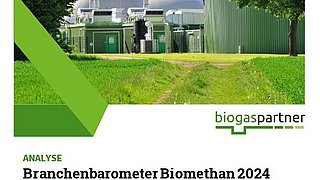Biomethane in Germany: Challenges and opportunities
The German biomethane market is resilient and future-orientated – despite current challenges.
Once again, the biomethane sector in Germany is experiencing a period of upheaval. In the past, major cuts in subsidies or political will have led to major distortions in the biomethane sector. However, the industry has never faced so many challenges as it does now.
Toni Reinholz, Renewable Energies Team Leader, and Klaus Völler, Renewable Energies Senior Expert, summarise the most important events in the industry in the new ‘Branchenbarometer Biomethan’ (Biomethane Industry Barometer).

Out of the frying pan into the fire
The energy crisis in 2021 and 2022 led to high purchase prices, but also rising production costs. As a result of the huge price fluctuations, one of the largest biomethane traders had to file for insolvency. The lucrative greenhouse gas reduction (GHG) quota also resulted in high profits by the end of 2022 and an increase in planning and construction activities for waste and residue-based biomethane projects. However, alleged fraud in upstream emissions reduction (UER) projects and imports from China caused the price to fall rapidly and led to further insolvency.
Nevertheless, the industry is using this experience to optimise its portfolio and refocus on future markets.
Heating market and fuel market are foreseeable growth markets
The heating and fuel markets in particular show potential. The revision of the German Buildings Energy Act opens up new opportunities for biomethane in the heating market. The demand for decentralised heating systems is estimated to be between 13 and 45 TWh by 2040, and use in heating networks is likely to further increase demand. The announced biomass package from the Federal Ministry for Economic Affairs and Climate Action could also create an attractive role for biomethane combined heat and power plants (CHP). The biomass package is intended to address flexible electricity production and renewable heat from biomass within a new funding framework. Demand for bio-LNG in particular is expected to increase in the fuel market, while every effort is being made to stabilise the GHG quota price, which has fallen sharply due to questionable UER projects and imports of biodiesel from China. If this succeeds, a large number of new construction projects will also be undertaken in the near future. Bio-LNG could open up new sales channels, particularly in heavy goods transport and shipping.
Solar and biomass package: Ground-breaking measures
The electricity market is facing new developments and incentives. An innovative biomass package is intended to boost the generation of flexible electricity and heat through a revised funding framework following a phase of low participation in tenders. Major changes were already made in the summer as part of the solar package, which should pave the way for successful tenders. The southern quota regulation, which meant plants would only be built in the south of the country in order to help stabilise the grid there, has been suspended. The maximum bid limit was also raised.
These two steps are seen as crucial for the success of future tenders according to surveys. The biomass package is likely to accelerate this development.
Internationally, emissions trading and sustainability guidelines are increasing the trade in biomethane. However, there are uncertainties regarding recognition, particularly for larger companies.
Conclusion
The biomethane industry is facing challenges, but also new opportunities. More stable regulatory frameworks, simplified approval procedures and clear political signals could help to better exploit the potential of biomethane for the energy transition. The industry is showing itself to be adaptable and is focussing on the markets of the future. It will be interesting to see how the sector develops in the coming years.